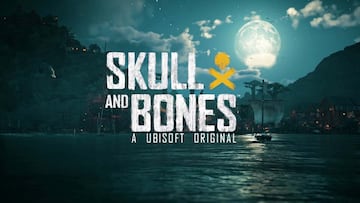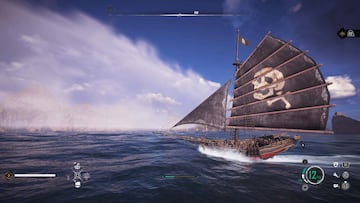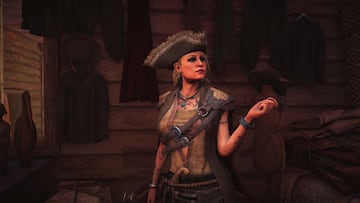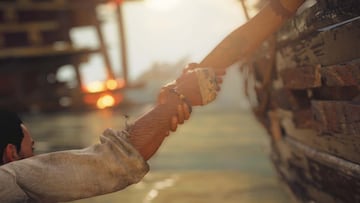Ubisoft
Skull & Bones: a pirate adventure that took a while to arrive
One of the most important promises that Ubisoft has had in recent years has finally touched port by the hand of Ubisoft Singapore, albeit with details.

Video game development times have lengthened in recent years, making it harder and harder to see new stories, characters, and franchises on the horizon, especially when it comes to major productions. Being in this long process, or entering development hell, that moment when a project just doesn’t seem to be moving forward can become increasingly difficult to distinguish, especially when the product is announced well in advance. This is the case with Skull & Bones, a title whose development began after the resounding success of Assassin’s Creed IV: Black Flag and its impressive use of ships to conquer the Caribbean, and which since 2014 has promised to bring an expanded experience of this mechanic in an entirely new franchise. After several delays, generational leaps, and the support of almost all of Ubisoft, it has finally arrived, but is it the game we were hoping for?
From shipwrecked sailor to pirate
Skull & Bones is a massively multiplayer game in which you create and control your character who, after being shipwrecked in the Indian Ocean following an attack by an English fleet, manages to make teir way on a wooden raft to the island of Sainte Anne to begin teir journey to becoming a pirate. The open world is impressive, as it is a very wide sea, with a multitude of islands, tasks, and missions to complete.
As such, Skull & Bones is divided into two parts, the first being the control of your character, which takes place before starting any mission, buying resources or making any improvements, interacting with other players and NPCs, or exploring some of the points on the islands. On the other hand, where most of the gameplay of the game will take place, will be in our ship, which could be said to be the true protagonist of the game, with which we will be dredging the seas, attacking other ships, and exploring much of this world. This is where the first discrepancies begin.

The world itself is impressive. With Ubisoft using a large number of studios to support this title, it’s amazing the level of detail that goes into the ocean, islands, ships, and many of the visual aspects of the game. As such, it is a world that despite several years of development has always tried to look pretty good and boy does it deliver. The scenery is set, but what about the structure?
Without a doubt, the structure of the game is one of the most shaky parts of Skull & Bones, and it’s not that it’s a terrible thing, it’s just that it’s showing its age. Progress has that rewarding feeling when you see that you’ve gotten your resources to build your own ship, or its cannons, or any of the various extras your ship can have that depend on you. That when, after a long process of grinding to get resources in a series of mini-games that go beyond with the realism that the game tries to provide, makes it all feel like a fairly simple mechanic. Added to this are the different missions that the game offers. On the one hand, some are fun, there’s combat, there’s excitement, or it’s simply trying again but first go for the resources you had to lose in a previous fight. On the other hand, some missions feel repetitive and lack that little random event or detail that makes the difference.

Another important element, especially in this type of game, is the ship. On the one hand, it feels good to be able to upgrade your ship on your own. Doing an upgrade is very satisfying, but some elements make the game experience not as good. The handling of the ship is almost like an arcade experience. You lower the sails in parts to increase speed, but you make sails to stop the ship as if you were putting on a handbrake, eliminating elements like inertia or even the wind itself pushing your ship. On the other hand, your crew will get tired while moving and taking care of these sails, so it looks more like your ship is the one that gets tired, sometimes you have to slow down your speed.
Fortunately, the combat is fun, and the mechanics of capturing an enemy ship are extremely fun. On the other hand, there is the cosmetic part to decorate your ship. Although the game offers a lot to decorate, there is little left in the free part, there is a large part that can be obtained with in-game coins (although it will take a long time) and on the other hand there is premium content that can be purchased with real money. These decorations range from the color of your ship, the design of the sails, the figurehead, to the clothing of your crew.

To this, we must add the mechanics of progression. First, we have Infamy, which is your progress as a pirate that allows us to unlock new levels of improvements that are essential to continue growing. This level increases as you progress through the game and perform these acts of... infamy, like plundering fortresses or sinking ships. On the other hand, is the level of the ship, grows depending on the type of equipment we add or improve. Better cannons or even the addition of a defensive mole on the bow will increase your level.

Skull & Bones is a title that, although visually impressive, is late to take a piece of the games-as-a-service pie. Ubisoft has shown us that with its big games as a service, there is hope (see the case of Rainbow Six Siege, or For Honor), while the smaller ones have been easier to separate. A polish in the mechanics, continued content and even a reduction in the entry price could save this ship. In a beginning of the year where AA titles have had more weight and have made it clear that it is more the gameplay and fun than a huge production, perhaps the future of AAAA, as its CEO Yves Guillemot called it, is not on such a good path.